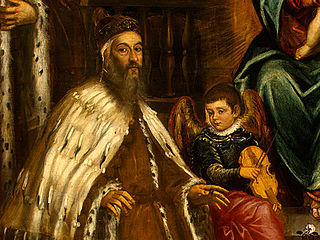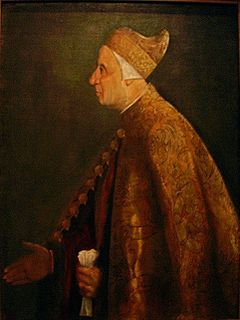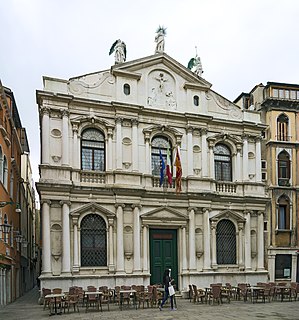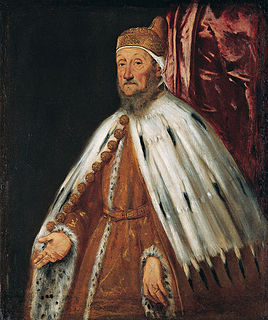Related Research Articles
Pietro Alessandro Guglielmi was an Italian opera composer of the classical period.

The Basilica di Santi Giovanni e Paolo, known in Venetian as San Zanipolo, is a church in the Castello sestiere of Venice, Italy.

The Mocenigo family was a Venetian family of Lombard Dalmatian origin. Many of its members were doges, statesmen, and soldiers. Notable Mocenigos include:

Pietro Lombardo (1435–1515) was an Italian Renaissance sculptor and architect; born in Carona (Ticino), he was the father of Tullio Lombardo and Antonio Lombardo.

Marco Barbarigo was the 73rd Doge of Venice from 1485 until 1486. His nomination took place on a new staircase in the courtyard of the Doge's Palace, on an axis with the Campanile of St. Mark and the Porta della Carta.

Angelo Emo was a Venetian noble and admiral, mostly known for being the last admiral of the Republic of Venice to lead the Venetian navy to battle. He attempted to introduce reforms based on the practices of the British Royal Navy, and led raids on Moorish targets along the Barbary Coast in retaliation for corsair attacks on Venetian-flagged shipping.
Berti is both an Italian surname and a given name. It is also the German familiar form of Berthold.

San Stae is a church in central Venice, in the sestiere of Santa Croce.

Pietro Mocenigo (1406–1476) was doge of Venice from 1474 to 1476.

Giovanni Ser di Mocenigo, Jr., Pietro Mocenigo's brother, was doge of Venice from 1478 to 1485. He fought at sea against the Ottoman Sultan Mehmed II and on land against Ercole I d'Este, duke of Ferrara, from whom he recaptured Rovigo and the Polesine. He was interred in the Basilica di Santi Giovanni e Paolo, a traditional burial place of the doges. His dogaressa was Taddea Michiel, who was to be the last dogaressa to be crowned in Venice until Zilia Dandolo in 1557, almost a century later.

There were three Doges, and many other prominent Venetians, called Alvise Mocenigo. Alvise I Mocenigo was doge of Venice from 1570 to 1577.

Alvise III Sebastiano Mocenigo (1662–1732) was the 112th Doge of Venice from 1722 to 1732. He was also Provveditore Generale (Governor) of Venetian Dalmatia twice.

Nicolò Marcello was the 69th Doge of Venice, elected in 1473. He held office for a short period, from 13 August 1473 to 1 December 1474. Said to have been inspired by a previous painting dating from the 15th century, Titian painted Nicolo Marcello's portrait long after his death.

Nicolò Tron was the 68th Doge of Venice, reigning from 1471 to 1473.

The Ateneo Veneto di Scienze, Lettere ed Arti is an institution for the promulgation of science, literature, art and culture in all forms, in the exclusive interest of promoting social solidarity, located in Venice, northern Italy. The Ateneo Veneto is made up of three-hundred members resident in the city and in the province of Venice, elected by the Assembly, which is also responsible for appointing the Chairman and the Academic Council. Honorary, Non-Resident and Foreign Members, elected by the Assembly also participate in the life of the Ateneo.

Carlo Francesco Pollarolo was an Italian composer, chiefly of operas. Born into a musical family, he became the cathedral organist of his home town of Brescia. In the 1680s he began composing operas for performance in nearby Venice. He wrote a total of 85 of them as well as 13 oratorios. His operatic style is noted for its development of arias accompanied by the orchestra and it shows some influence from the contemporary French opera of Jean-Baptiste Lully.

Pietro Loredan of the noble Loredan family, was the 84th Doge of Venice, reigning from 1567 to 1570.
This article presents a detailed timeline of the history of the Republic of Venice from its legendary foundation to its collapse under the efforts of Napoleon.
Pietro Pariati was an Italian poet and librettist. He was initially secretary to Rinaldo d'Este (1655–1737), Duke of Modena. Then from 1699 to 1714, he made his living as a poet in Venice, initially writing librettos with Apostolo Zeno, then independently. Then finally from 1714-1729 he was Metastasio's predecessor at the Vienna court of Charles VI, Holy Roman Emperor.
References
- ↑ Dizionario biografico universale, Volume 1, compiled by Gioacchino Maria Olivier-Poli, Naples (1824); page 283.